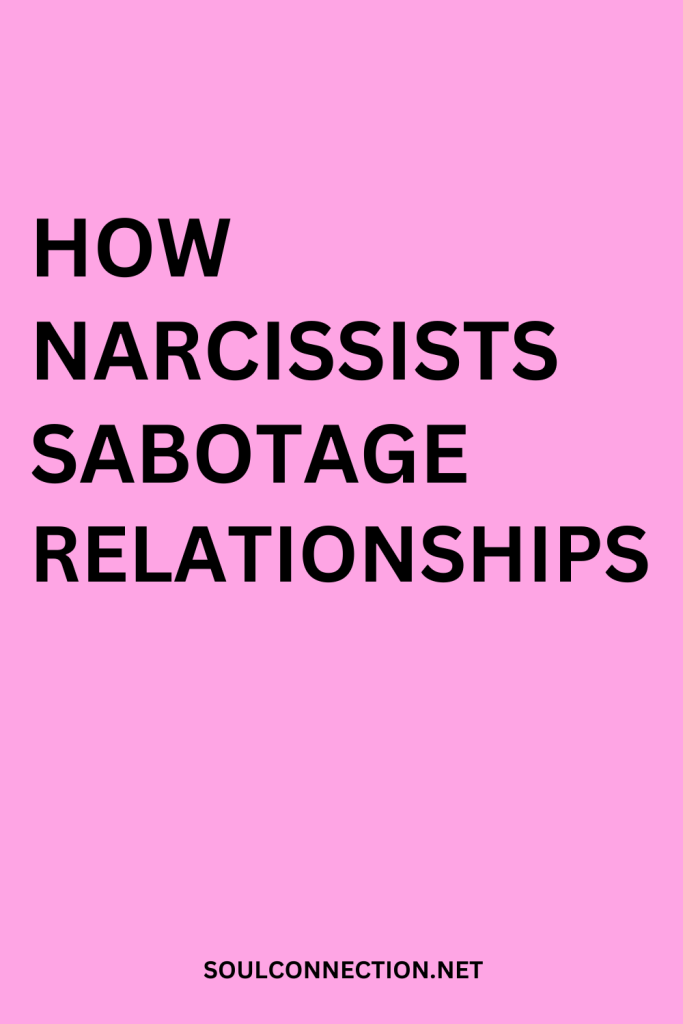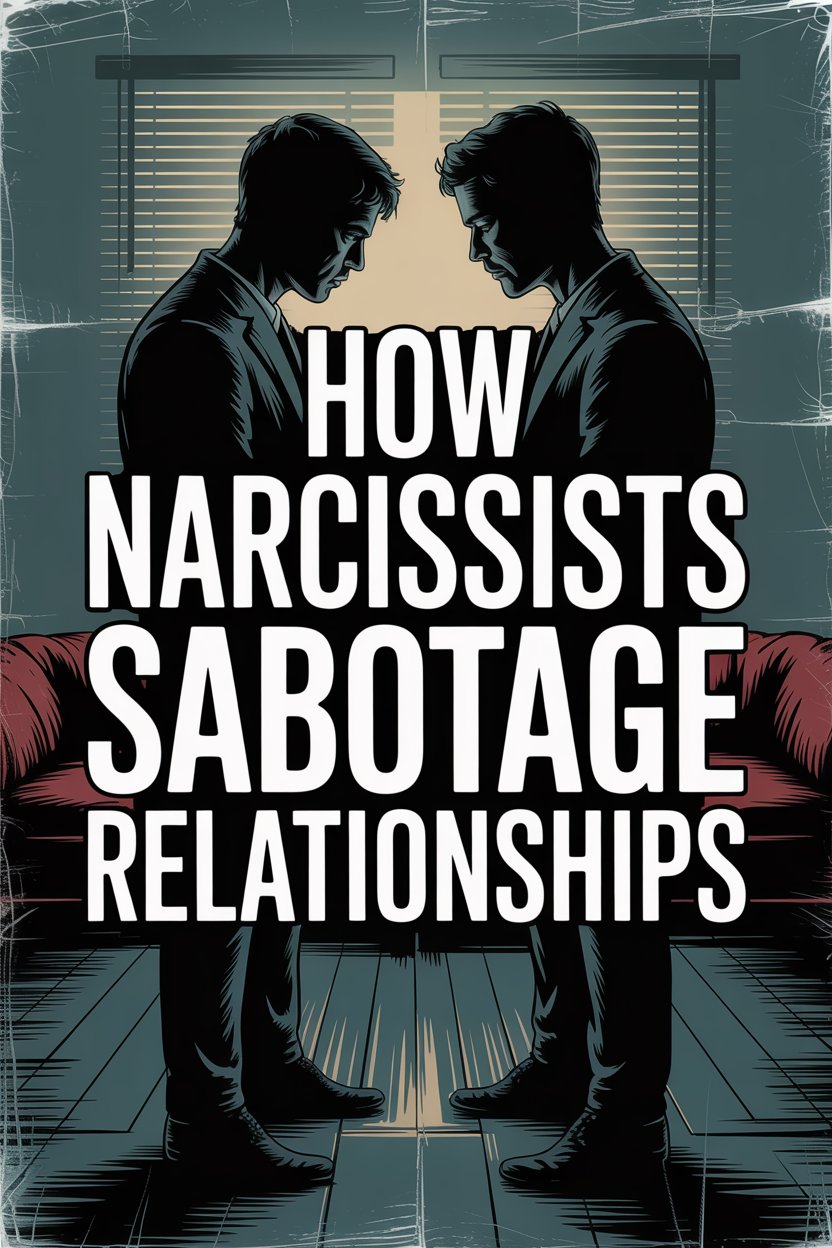Picture this: You’re gliding along in what seems to be a perfectly good relationship, humming along to the soundtrack in your head, only to suddenly trip over what feels like an emotional banana peel.
If things keep going sideways and you’re constantly asking yourself, “Is it me, or is there something off here?” — there’s a chance narcissism is stinking up the joint.
Narcissists have a sixth sense for upending intimacy, trust, and even your own sense of reality. They don’t just sabotage relationships by accident. It’s practically a hobby.
Let’s pull back the curtain and see how the magic (read: mayhem) really happens.
The Shiny Beginning and the Sudden Switch
Everyone loves a good rom-com montage—flowers, compliments, grand gestures. Narcissists are Oscar-worthy in this phase, with love-bombing that makes you feel like the main character.
And then—the plot twist. The adoration fades faster than supermarket flowers. The narcissist loses interest, gets bored, or decides you’re “not living up to their standards.”
Cue the cold shoulder, silent treatments, and a level of indifference that leaves you wondering if you imagined all those sweet nothings.
This about-face isn’t your fault. Narcissists are attracted to the high of a new conquest, but quickly tire once the thrill of the chase is gone.
Once you become “real” and have needs of your own, you’re less of a shiny prize and more of a burden.
Gaslighting Until You Doubt Gravity
Ever find yourself apologizing for things you didn’t do? Or maybe you start questioning your memory (“Did I really say that?”) after a simple disagreement? Welcome to the gaslight district.
Narcissists excel at making you doubt yourself. They’ll deny things they said, change the narrative, or insist your feelings are “too much.”
Suddenly you’re in a never-ending debate club where the only rule is: You’re always wrong.
This isn’t a character-building exercise. It’s psychological warfare, designed to keep you off-balance and easy to control. Your confusion becomes their comfort zone.
Withholding Love Like It’s a Black Market Commodity
Affection, support, or even basic kindness can become rewards for obedience. A narcissist’s affection is dished out in teaspoons, and only when you’ve met their ever-changing demands.
Speak up about your needs, and watch the temperature drop. Do something that benefits them? Cue a crumb of affection (just enough to keep you hungry).
Over time, you may find yourself desperate for even the tiniest sign of approval—a classic sign things have gone pear-shaped.
Playing the Blame Game on Hard Mode
Arguments with a narcissist feel like trying to win at Monopoly when the other player keeps changing the rules. No matter what goes wrong, it’s somehow your fault.
Seriously, if their coffee is cold, you probably distracted them. If they’re late, you didn’t remind them enough times.
Apologies? Only from you. Narcissists rarely take responsibility. It keeps you on the defense, spinning your wheels trying to fix things that aren’t your doing.
Jealousy, Control, and the Disappearing Boundaries
Narcissists want to be the sun around which your world revolves—but the second you shine elsewhere, the claws come out. Friends, family, hobbies—anything that takes your attention away is a threat.
Expect guilt trips, sly digs about your friends, or straight-up rules about who you can see and when. It’s not devotion; it’s control in disguise.
Boundaries become optional (for them), but non-negotiable (for you). Double standards are the house special.
Triangulation Bring In the Third Act
Just when you think you’ve got your bearings, enter stage left: the third party. Could be an ex, a friend, a colleague—anyone to make you feel less secure.
Maybe they talk up how “understanding” their ex was, or casually mention how a friend agrees you’re “too sensitive.” The aim? To keep you feeling competitive, uncertain, and hooked on their approval.
This tactic isn’t about healthy relationships or friendships. It’s about keeping you guessing, and keeping the narcissist center stage.
Emotional Rollercoasters and Hot-Cold Confusion
Consistency is not a narcissist’s strong suit. Sweet one moment, icy the next, they keep you chasing that initial high, like a gambler pouring coins into a rigged slot machine.
You’re left burning emotional calories trying to decode their moods and anticipate their reactions. This kind of unpredictability can be addictive—your brain gets hooked on the drama, hoping things will go back to the good old days.
Spoiler: That calm, steady phase never lasts.
Sabotaging Your Confidence Bit by Bit
Compliments are rare treasures, but criticism? That’s available in bulk.
Narcissists have a knack for undercutting your confidence, sometimes with backhanded compliments (“Not bad for you”) or thinly veiled put-downs (“Are you really wearing that?”).
Over time, these digs chip away at your self-worth, making you easier to control. You start believing you’re lucky to have them, when the truth is—they’re the lucky ones.
Financial Manipulation and Sabotage
Money matters can get murky. Some narcissists restrict access to shared funds, isolate you from your own finances, or make large purchases without your input.
Others may encourage you to quit your job “because they’ll take care of everything,” only to later hold that over your head.
It’s about power, not partnership. And it’s one more way to keep you dependent.
Turning Others Against You
Ever feel like your friends or family are suddenly distant? Narcissists are skilled at working the room, sowing seeds of doubt about you behind your back. Maybe it’s subtle hints (“She’s really stressed lately…”) or outright lies.
The goal is to isolate, making it harder for you to leave or even see the sabotage for what it is. When you’re cut off from support, everything feels harder.
Moving the Goalposts
Just when you think you’ve finally met their expectations, those expectations do the cha-cha out of reach. No matter how much you give, it’s never enough.
Tasks, affection, standards—it all shifts. This constant moving of the goalposts keeps you striving, exhausted, and doubting your own worth.
Practical Tips For Surviving Sabotage
Spotting the sabotage is step one. Putting a stop to it is where the real work begins.
Start by keeping a journal of interactions. Written proof helps you see patterns and reality, especially when you’re being gaslit. Plus, it’s satisfying to have receipts.
Connect with people who know you well. Old friends, trusted family—anyone who can remind you of who you are when your confidence starts to wobble.
Setting boundaries is not just a buzzword; it’s essential armor. Be specific about what you will and won’t tolerate, and stick to it, even if it ruffles feathers. If “no” isn’t in your vocabulary yet, time to get practicing.
Professional support can be a game-changer. Therapists with experience in narcissistic abuse can help untangle the mess and rebuild your sense of self.
Above all, remember: love shouldn’t feel like survival mode. If you’re constantly bracing for impact, it’s time to ask some tough questions—starting with, “What would my life look like if I stopped trying to fix this person?”
Reclaiming Your Sanity
Living with a narcissist’s sabotage is an emotional marathon with no finish line in sight.
The sooner you see the signs, the faster you can lace up your metaphorical trainers and run—not walk—toward real connection and peace of mind.
Self-worth isn’t up for negotiation. Relationships should lift you, not leave you on eggshells.
If you’re reading this with a knowing sigh, trust that you’re not alone—and you’re more than capable of rewriting your story, minus the narcissistic plot twists.
Sometimes, the healthiest relationship move is the one that lets you breathe easy again.
And yes, the other side really does exist—less drama, fewer banana peels, and a whole lot more you.


